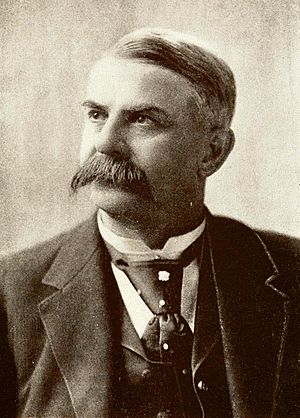Eugene Fitch Ware facts for kids
Quick facts for kids
Eugene Fitch Ware
|
|
|---|---|
 |
|
| Born | May 29, 1841 Hartford |
| Died | July 1, 1911 (aged 70) Cascade |
| Political party | Republican Party |
| Position held | member of the State Senate of Kansas (1879–1885) |
Eugene Fitch Ware (born May 29, 1847 – died July 1, 1911) was an American soldier, lawyer, politician, and writer. He sometimes wrote under the pen name Ironquill.
Contents
Early Life and Moving West
Eugene Fitch Ware was born in Hartford, Connecticut, on May 29, 1847. When he was young, his family moved to Burlington, Iowa. After the Civil War, he moved to Kansas in May 1867. He settled on a large piece of land in Cherokee County, Kansas.
Military Service in the Civil War
Ware joined the Union Army in April 1861. He was part of the First Iowa Volunteer Infantry. This was at the start of the American Civil War. After his first time serving, he joined the Fourth Iowa Cavalry.
In September 1863, Ware became a lieutenant. He served in the 7th Iowa Cavalry Regiment. He took part in the Powder River Expedition. This was a military campaign led by General Patrick Edward Connor. After this campaign, Ware was promoted to captain.
Writing and Journalism
After the Civil War ended, Ware returned to Burlington, Iowa. For a short time, he worked as an editor for a local newspaper. It was called the Burlington Hawkeye.
In September 1870, he moved to Fort Scott, Kansas. He got a job at the Fort Scott Monitor newspaper. By 1872, Ware became the editor of the Monitor. He started publishing poems in 1874. He used the pen name "Ironquill" for his writings. One of his most famous poems was "The Washerwoman's Song." It was first published in 1876 and became very popular.
Political Career and Law
Ware was also active in politics. He served in the Kansas Senate from 1879 to 1885. This is where laws are made for the state of Kansas. He was a member of the Republican Party.
Besides politics, Ware worked as a lawyer. He practiced law in Topeka, Kansas. He was chosen twice to be a delegate. This meant he represented his state at the Republican National Convention. This is a big meeting where the Republican Party chooses its candidate for president.
In 1902, President Theodore Roosevelt gave Ware an important job. He was named the United States Commissioner of Pensions. This role involved managing payments to veterans and their families. He held this position until 1904.
Eugene Fitch Ware passed away on July 1, 1911. He was on vacation in Cascade, Colorado, at the time.
 | Audre Lorde |
 | John Berry Meachum |
 | Ferdinand Lee Barnett |

